
Welcome to The Regenerators.
Introduction
Climate change is the shift in the Earth’s weather conditions over many years.
Our world has been getting hotter due to things humans are doing, like the way we make energy, farm and cut down trees.
This is dangerous for humans, wildlife and the planet.
But it's not too late! By working together, everyone can help.
What is climate change?
What's the difference between weather and climate? Why is climate change bad for the planet? Watch this video to find out.
Narrator: Some days it can be raining, or sunny, snowing, raining again! Rain, sun, snow, wind are all different types of weather. If we know what kind of weather a place has over a long time, we call that its climate.
Somewhere hot and dry, won't have the same type of plants and animals plants and animals as somewhere hot and wet.
You couldn't find a fish living up a tree, or could you? There is a huge layer of gases around the planet called the atmosphere. This contains a layer of greenhouse gases greenhouse gases such as carbon dioxide and methane.
The greenhouse gas layer acts a bit like a blanket, trapping heat and keeping everything here warm and safe. But like a blanket it can also trap too much heat. Like being in a classroom on a hot day, if we close some of the windows, the room very quickly gets hotter and uncomfortable.
The closed windows are letting the light and the heat in, but not out again. The windows are like the earths layer of greenhouse gases, only made from glass instead of gas.
As humans burn fossil fuels and farm unsustainably, more greenhouse gases are being released into the atmosphere. This means that more heat is getting trapped and the planet is getting hotter.
We're getting more extreme weather like heatwaves, floods and storms. In cold parts of the world, ice and snow are melting. When ice on land melts, more water goes into the oceans. If we carry on getting hotter, the waves at the beach will come in further and we might just find a fish, in a place that used to be a forest.
Our actions can hurt the planet, but we can also help heal the planet. And we can all make a difference. If we stop closing the windows the room stops getting hotter, then we can all breath a little easier and live safe in the knowledge that our climate won't continue to change.
The atmosphere and greenhouse gases
Around the Earth is a thick layer of air known as the atmosphere.
Beyond the atmosphere is outer space, where there is no air at all.
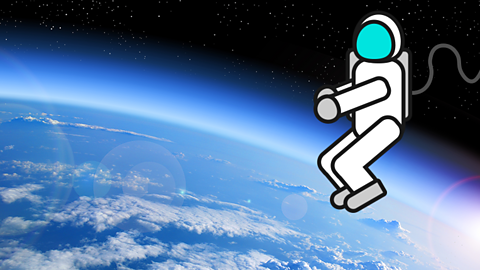
In the Earth's atmosphere are many types of gas.
Two of these gases are carbon dioxide and methane, which we call greenhouse gases.
Greenhouse gases form a thin layer around the Earth. This acts like a kind of fluffy blanket, keeping us nice and warm.
Without it, it would get so cold we’d all freeze!
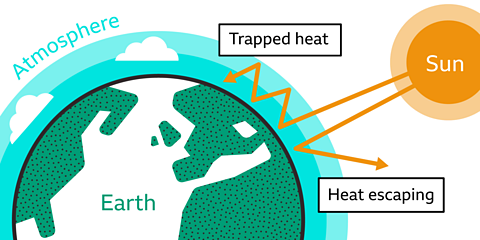
For thousands of years, the greenhouse gas layer stayed roughly the same.
This was great news for humans, as it gave us just the right conditions for living and farming. Nice and warm, but not too warm.
Global warming
For many years, humans have been adding greenhouse gases to the atmosphere by burning fossil fuels to release energy, cutting down trees, over-farming and creating waste.
Because of this, the greenhouse gas layer has been getting thicker, meaning more heat is being trapped and the Earth is getting hotter.
This is known as global warming.
How much hotter is the world?
Around two hundred years ago, in a time known as the Industrial Revolution, humans started burning lots more fossil fuels, farming lots more cows and cutting down lots more trees.
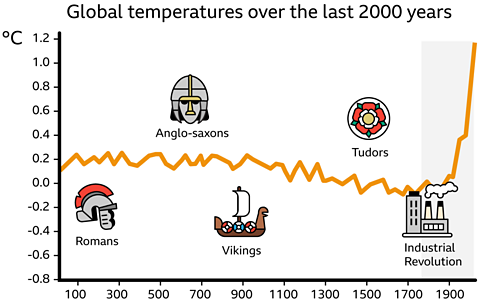
Since the Industrial Revolution, the average temperature on our planet has increased by just over one degree Celsius.
Do you think one degree is a lot of heat?
It doesn't sound like much. It's easy to warm up smaller things, like your hands in a pair of gloves or a cup of water.
But try to imagine how hard it is to warm up something as huge as our planet! It takes an awful lot of extra heat to warm up something that enormous by just one degree.
In fact, the Earth is now hotter than it has been in over 100,000 years.
Climate change
The extra heat in our atmosphere is causing big changes to the long-term conditions on our planet, known as our climate.
This is producing more extreme weather.
Parts of the world that were already hot are becoming even hotter and drier. This leads to heatwaves, lack of water and forest fires.
The extra heat is also causing more water to go up from our oceans to form clouds, which then fall as rain.
This leads to extreme weather like storms, hurricanes and floods.
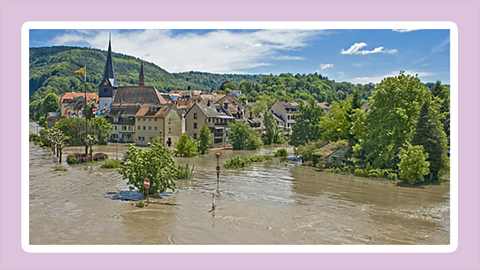
Hotter seas and oceans
A lot of the extra heat is making water in the ocean hotter.
As the water gets hotter it makes it harder for sea creatures to survive.
Another problem is that when water gets hotter, it expands. This means it takes up more space, which leads to rising sea levels.

The extra heat in our atmosphere and in our seas also means more ice is melting in cold places like the Arctic and Antarctica.
This makes life very hard for creatures like polar bears and penguins who need ice to hunt and survive.
When ice on land melts, the water runs off into the sea, which causes sea levels to rise even more.
What can we do to help?
It's okay to feel worried about climate change.
But remember that if we all work together we can fix this situation!
There are lots of ways you can get involved.
Speak to people about how you feel. Listen and share ideas with them.
Your actions will inspire others.
You are never too small to make a difference.
– Greta Thunberg
Lesson complete!
Well done Regenerator, you've completed this lesson. Now let's see what you can remember.
You are a climate hero!
You have been awarded the Regenerators climate hero certificate.
Now you can colour in and decorate your certificate.
Use drawings, words or art - anything which feels special to you.
Climate hero certificate. documentClimate hero certificate
GREEN CLASSROOM

Ask an adult if you can download and print this certificate, or open it with painting software.
Or you can make your own certificate on blank paper.
There's more to learn
Explore more lessons and content from around the BBC.
How can we look after our environment?
GREEN CLASSROOM
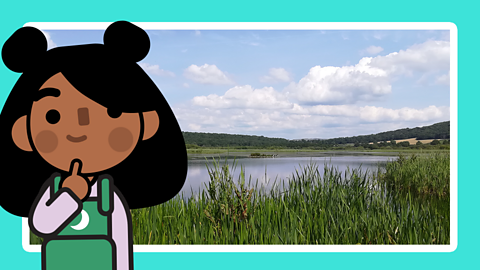
What living things can I find near me?
GREEN CLASSROOM
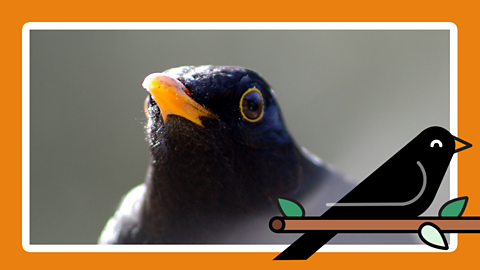
Year 1 - 2 and P2 - P3
GREEN CLASSROOM
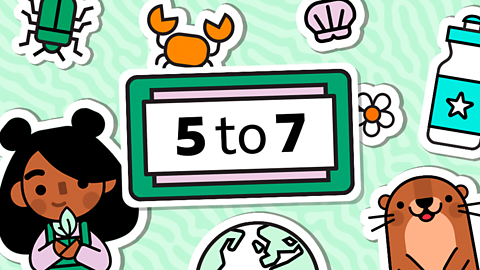
More from The Regenerators
BBC BITESIZE
